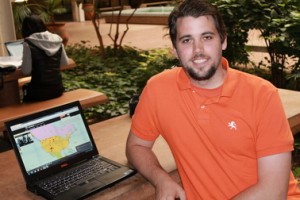Sustainability alum helps millennials live more mindfully
View Source | June 5, 2014
 School of Sustainability alumnus Andrew Krause has found practical application for his education through technology that helps users discover, adopt and share ideas for leading a more sustainable lifestyle. The eEcosphere app, now available for iOS, matches millennials with ideas that are tailored to their needs and improve their everyday decisions by providing quality local resources. This helps to prevent the common breakdown between intention and action while providing the user with a fun and collaborative experience.
School of Sustainability alumnus Andrew Krause has found practical application for his education through technology that helps users discover, adopt and share ideas for leading a more sustainable lifestyle. The eEcosphere app, now available for iOS, matches millennials with ideas that are tailored to their needs and improve their everyday decisions by providing quality local resources. This helps to prevent the common breakdown between intention and action while providing the user with a fun and collaborative experience.
Krause, who received a Master’s of Science from the School of Sustainability in 2012, was recently named as a delegate to the United Nations Foundation Global Accelerator 2014. He and fellow delegates will work with policy leaders on global issues to create innovative advancements toward key Millennium Development Goals. Because the accelerator seeks out the world’s top 100 entrepreneurs, the appointment is a great testament to the significance of Krause's work.





 The Arizona Solar Summit brings together people and organizations to advance the solar industry on both the regional and national levels, creating a network to propel Arizona to national prominence in the industry.
The Arizona Solar Summit brings together people and organizations to advance the solar industry on both the regional and national levels, creating a network to propel Arizona to national prominence in the industry.



 Life in a warming world is going to require human ingenuity to adapt to the new realities of Earth. Greenhouse-gas-induced warming and megapolitan expansion are both significant drivers of our warming planet. Researchers are now assessing adaptation technologies that could help us acclimate to these changing realities.
Life in a warming world is going to require human ingenuity to adapt to the new realities of Earth. Greenhouse-gas-induced warming and megapolitan expansion are both significant drivers of our warming planet. Researchers are now assessing adaptation technologies that could help us acclimate to these changing realities.
 Arizona State University engineers will lead two multi-university/industry research teams in support of a new U.S. Department of Energy program to develop technologies that use the full spectrum of sunlight to produce inexpensive power during both day and night.
Arizona State University engineers will lead two multi-university/industry research teams in support of a new U.S. Department of Energy program to develop technologies that use the full spectrum of sunlight to produce inexpensive power during both day and night.



 Humans living in densely populated urban areas have a profound impact not only on their physical environment, but also on the health and fitness of native wildlife. For the first time, scientists have found a direct link between the degree of urbanization and the prevalence and severity of two distinct parasites in wild house finches.
Humans living in densely populated urban areas have a profound impact not only on their physical environment, but also on the health and fitness of native wildlife. For the first time, scientists have found a direct link between the degree of urbanization and the prevalence and severity of two distinct parasites in wild house finches.





